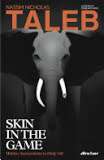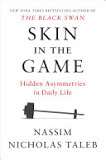Skin in the Game (book)
Skin in the Game: Hidden Asymmetries in Daily Life (acronymed: SITG) is a 2018 nonfiction book by Nassim Nicholas Taleb, a former options trader with a background in the mathematics of probability and statistics.
  | |
| Author | Nassim Nicholas Taleb |
|---|---|
| Country | United States |
| Language | English |
| Series | Incerto |
| Subject | Philosophy |
| Publisher | Random House |
Publication date | February 27, 2018 |
| Media type | Print, E-book, Audiobook |
| Pages | 304 |
| ISBN | 978-0-425-28462-9 (Hardcover) |
| Preceded by | Antifragile |
Taleb's thesis is that skin in the game -- i.e., having a measurable risk when taking a major decision -- is necessary for fairness, commercial efficiency, and risk management, as well as being necessary to understand the world.[1] The book is part of Taleb's multi-volume philosophical essay on uncertainty, titled the Incerto, which also includes Fooled by Randomness (2001), The Black Swan (2007–2010), The Bed of Procrustes (2010–2016), and Antifragile (2012). The book is dedicated to "two men of courage": Ron Paul,[2] "a Roman among Greeks"; and Ralph Nader,[3] "Greco-Phoenician saint".[4][5]
Asymmetry and missing incentives
If an actor pockets some rewards from a policy they enact or support without accepting any of the risks, economists consider it to be a problem of "missing incentives". In contrast, to Taleb, the problem is more fundamentally one of asymmetry: one actor gets the rewards, the other is stuck with the risks.[1]
Taleb argues that "For social justice, focus on symmetry and risk sharing. You cannot make profits and transfer the risks to others, as bankers and large corporations do... Forcing skin in the game corrects this asymmetry better than thousands of laws and regulations."[6][7][8]
The centrality of negative incentives
Actors - per Taleb - must bear a cost when they fail the public. A fund manager that gets a percentage on wins, but no penalty for losing is incentivized to gamble with his clients funds. Bearing no downside for one's actions means that one has no "Skin In The Game", which is the source of many evils.
An evolutionary process is an additional argument for SITG. Those who err and have SITG will not survive, hence evolutionary processes will eliminate (physically or figuratively by going bankrupt etc) those tending to do stupid things. Without SITG, this process cannot work.
Examples
Robert Rubin, a highly-paid director and senior advisor at Citigroup, paid no financial penalty when Citigroup had to be rescued by U.S. taxpayers due to overreach.[7] Taleb calls this sort of a trade, with upside gain but no or limited downside risk, a "Bob Rubin trade."[9]
Many war hawks don't themselves bear any risks of dying in a war they advocate.
Intellectual Yet Idiot
Intellectual Yet Idiot (IYI) is a term coined by Nassim Nicholas Taleb in his essay by the same name that refers to the semi-intelligent well-pedigreed "who are telling us 1) what to do, 2) what to eat, 3) how to speak, 4) how to think… and 5) who to vote for". They represent a very small minority of people but have an overwhelming impact on the vast majority because they affect government policy. IYI are often policy makers, academics, journalists, and media pundits.
The IYI pathologizes others for doing things he doesn't understand without ever realizing it is his understanding that may be limited. He thinks people should act according to their best interests and he knows their interests, particularly if they are "red necks" or English non-crisp-vowel class who voted for Brexit. When plebeians do something that makes sense to them, but not to him, the IYI uses the term "uneducated". What we generally call participation in the political process, he calls by two distinct designations: "democracy" when it fits the IYI, and "populism" when the plebeians dare voting in a way that contradicts his preferences.[10]
Taleb points out that being educated and "intellectual" does not always mean that someone isn't an idiot for most purposes. "You can be an intellectual yet still be an idiot. 'Educated philistines' have been wrong on everything from Stalinism to Iraq to low-carb diets."
Taleb dedicates a chapter to IYIs in his book Skin in the Game.
Usage
The term was picked up and used late in the 2016 U.S. presidential election by Newt Gingrich when he criticized the negative response Trump received after the first presidential debate stating that "The Intellectual Yet Idiot class is so out of touch with America that they don't even realize how badly they are doing and how well Trump is doing."[11] Gingrich has mentioned the term multiple times in interviews and speeches since then [12][13][14] and has included in his book Understanding Trump a chapter called "The Rise of the IYI".[15]
The term has since been used extensively and has been cited in numerous periodicals including The Guardian,[16] Financial Times,[17] and The New Statesmen.[18] Jonah Goldberg, in an article from the National Review, reference the term in defense of non-liberal intellectuals who have been branded "anti-intellectual" by the Left.[19] Graham Vyse in his article "Democrats Should Stop Talking About Bipartisanship and Start Fighting" from The New Republic referenced Gingrich's use of IYI as divisive and that until the Republicans become more collaborative, "Democrats need to drop the subject, too, and fight like hell instead."[20]
Other ideas
Minority rules
A "stubborn minority" can impose its will on the relatively disinterested majority. A halal eater, for example, will never eat non-halal food, but a non-halal eater isn't banned from eating halal. Thus, a catering company switches to serving halal meat despite its being preferred only by a tiny minority of its customers.[6][8]
Christology
The book delves into Christology. Michael Bonner writes: "Observers who are interested in, or baffled by, the Christological debates of the first five hundred years of Christianity may be shocked by Taleb’s explanation for the Church’s insistence upon the full humanity of Jesus. The short answer is that it was essential for God to have — literally — skin in the game, and that Christ’s full participation in crucifixion, self-sacrifice, and death made him the archetypal risk-taker."[21]
Reception and criticism
Branko Milanović wrote that Taleb has created "a full system that goes from empirics to ethics, a thing which is exceedingly rare in modern world."[22] The Economist described reading the book as similar to "being trapped in a cab with a cantankerous and over-opinionated driver."[23] Matthew Syed of The Times was "mostly persuaded" by the main argument of the book.[24] The Guardian published an ambivalent review, noting that Taleb's "combination of fearlessness, self-belief and immodesty adds up to charisma on the page" but that "every idea that sounds as if it might work in the abstract fails in the particular".[25] Taleb responded with a list of the flaws and "reading comprehension" in the reviews in The Economist and The Guardian (claiming that journalists have an agency problem with subjects criticizing their profession for lack of skin of the game).[26]
Audiobook
The audiobook version is narrated by Joe Ochman and reached #4 on the Audible.com's nonfiction list in March 2018.[27]
Quotes from the Book
- The knowledge we get by tinkering, via trial and error, experience, and the workings of time, in other words, contact with the earth, is vastly superior to that obtained through reasoning, something self-serving institutions have been very busy hiding from us.[28]
- Bureaucracy is a construction by which a person is conveniently separated from the consequences of his or her actions.[29]
- Avoid taking advice from someone who gives advice for a living, unless there is a penalty for their advice.[30]
- Seeing the psychologist Steven Pinker making pronouncements about things intellectual has a similar effect to encountering a drive-in Burger King while hiking in the middle of a national park.[31]
- Evidence of submission is displayed by the employee’s going through years depriving himself of his personal freedom for nine hours every day, his ritualistic and punctual arrival at an office, his denying himself his own schedule, and his not having beaten up anyone on the way back home after a bad day. He is an obedient, housebroken dog.[32]
- What we saw worldwide from 2014 to 2018, from India to the U.K. to the U.S., was a rebellion against the inner circle of no-skin-in-the-game policymaking “clerks” and journalists-insiders, that class of paternalistic semi-intellectual experts with some Ivy League, Oxford-Cambridge or similar label-driven education who are telling the rest of us 1) what to do, 2) what to eat, 3) how to speak, 4) how to think, and… 5) whom to vote for.[33]
- People who are bred, selected, and compensated to find complicated solutions do not have an incentive to implement simplified ones.[34]
- If your private life conflicts with your intellectual opinion, it cancels your intellectual ideas, not your private life.[35]
- Survival comes first, truth, understanding, and science later.[36]
References
- Taleb, Nassim Nicholas (2018). "Introduction". Skin in the Game: Hidden Asymmetries in Daily Life. Random House. ISBN 9780425284629.
- "Ron Paul Liberty Report, 03/15/18". 16 March 2018.
- "Skin in the Game – Ralph Nader Radio Hour". ralphnaderradiohour.com.
- Taleb, Nassim Nicholas (15 April 2018). Skin in the Game: Hidden Asymmetries in Daily Life. Random House. ISBN 9780425284629 – via Google Books.
- "Getting Under Nassim Nicholas Taleb's Skin". gcallah.github.io.
- Williams, Zoe (22 February 2018). "Skin in the Game by Nassim Nicholas Taleb review – how risk should be shared". The Guardian. Retrieved 24 February 2018.
- "Should risk-takers be required to have 'skin in the game'?". Financial Times. 2018. Retrieved 24 February 2018.
- "Nassim Taleb explains the power of "skin in the game"". The Economist. 2018. Retrieved 24 February 2018.
- Your Simple Things You Should Do to Succeed In the Stock Market, 23 April 2018.
- "The Intellectual Yet Idiot, By Nassim Nicholas Taleb".
- "Newt Gingrich: Trump won the debate. Don't believe the "Intellectual Yet Idiot" class".
- "TRUMP ADMINISTRATION POLICY AGENDA, "Intellectual Yet Idiot"". C-SPAN. 2016-12-23. Retrieved 2017-07-18.
- "Gingrich Predicts Cabinet Will Dismantle Federal Bureaucracy".
About 288,000 federal workers are employed in Washington, and "I'll guarantee you" 35 percent or 40 percent of them fit Taleb's description. The answer is not to figure out how to manage them, but to get rid of them
- "It's the end of the world as we know it".
- Newt Gingrich (2017). Understanding Trump. Center Street. ISBN 978-1478923084.
- https://www.theguardian.com/books/2017/jun/20/newt-gingrich-book-understanding-trump. Missing or empty
|title=(help) - https://www.ft.com/content/a21da152-1b01-11e8-a748-5da7d696ccab. Missing or empty
|title=(help) - "Why author Nassim Nicholas Taleb is the ideal public thinker for the age of Trump".
- "The Science of Intellectual Tribalism". 2017-01-20.
- "Democrats Should Stop Talking About Bipartisanship and Start Fighting". The New Republic. 2016-12-15.
- Bonner, Michael R.J., Aphorisms from Antique Lands, The Dorchester Review, Spring/Summer 2018
- Branko Milanović, The Importance of Taleb’s System: From the Fourth Quadrant to the Skin in the Game Global Policy Journal, 29 January 2018
- Nassim Taleb explains the power of “skin in the game” And settles some old scores The Economist, 22 February 2018
- Review: Skin in the Game by Nassim Nicholas Taleb — down with the ‘Intellectual Idiots’ The Times, 24 February 2018
- Skin in the Game by Nassim Nicholas Taleb review – how risk should be shared Zoe Williams, The Guardian, 22 February 2018
- Taleb's response
- https://wtop.com/entertainment/2018/03/the-top-10-audiobooks-on-audible-com/
- p. 7
- p. 12
- p. 23
- p. 43
- p. 98
- p. 123
- p. 162
- p. 185
- p. 214